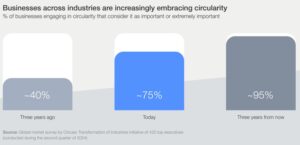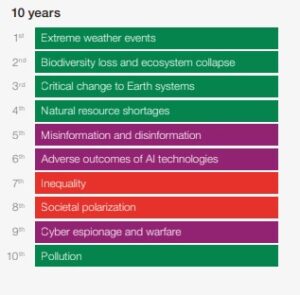Website – UKSSN Operations Group
LinkedIn – (3) UK Schools Sustainability Network Operations Group | Groups | LinkedIn
Last night we held our first UKSSN Ops group network meeting for 2025. The focus of the meeting was sustainable ICT with a conversation that explored some of how we buy ICT, the use and consequences of AI, ethical disposal of ICT, and reflections on how to target action to achieve the greatest impact. Thank you to Bobby Mitchell (Pure IT Refurbished), Joe Basketts (GivEducation), Sam Frost (Air Ambulance Service) and Neil Limbrick (Education Collective) for your help and support. A recording of the meeting is available on the website and presentations will be uploaded shortly (website menu Community-Links and filter on UKSSN Network Meetings). A few reflections on the discussion –
🤔 On refurbishment and ethical disposal –
Business is starting to recognise the benefits of investing in the circular economy and the costs of business-as-usual.

In the European Union (EU), consumers lose about €12 billion yearly by replacing goods rather than repairing them and extending their useful life. Disposing of goods before they have reached the end of their useful life produces 261 million tons of CO2-equivalent (CO2 eq) emissions, uses 30 million tons of resources, and creates 35 million tons of waste annually. ICT is an area where schools can actively support a more circular model.
- Extend the life – Protecting Your Hardware: 20 Ways To Extend The Life Of Tech Devices
- Buy refurbished – 5 Things To Check Before Buying A Refurbished Laptop
- Windows 10 extension – Refurbished Grades: What They Mean and Why They Matter
🤔 On AI in schools
According to the International Energy Agency (IEA), in 2022, data centres consumed 1.65 billion gigajoules of electricity — about 2% of global demand. Widespread deployment of AI will only increase electricity use. By 2026, the agency projects that data centres’ energy consumption will have increased by between 35% and 128% — amounts equivalent to adding the annual energy consumption of Sweden at the lower estimate or Germany at the top end.

Yet there is a clear use-case for AI in schools and AI systems will help in tackling environmental challenges, for example –
- Embracing AI to reduce teacher workload
- Designing Buildings: AI aids in creating structures that consume less energy.
- Smart Energy and Plant Management: AI systems automatically control lighting and heating and can monitor plant and machinery.
- Deploying Renewable Energy: AI enhances the efficiency and placement of renewable energy sources.
- Monitoring Air Quality: AI-driven sensors provide real-time air quality data, helping to address pollution.
- Enhancing Waste Management: AI optimises waste collection and recycling processes.
- Monitoring Deforestation: AI analyses satellite imagery to detect deforestation activities.
- Monitoring of Global Emissions: AI processes satellite data to monitor greenhouse gas emissions worldwide.
- Predicting Weather Events: AI models forecast severe weather, allowing for timely warnings and disaster preparedness.
A great blog by Emma Darcy (Chiltern Learning Trust) on the opportunities and risks of AI in education. The DfE has now appointed Chiltern Learning Trust – a multi-academy trust that operates 18 schools in Luton and the rest of Bedfordshire – to support the delivery of AI guidelines intended to help teachers and senior managers safely deploy artificial intelligence technologies. AI is not going away; there are significant opportunities for schools in embracing AI, but we must also remain conscious of the threats and learn to mitigate the potential harms.
🤔 On switching ICT off
Energy Sparks have kindly shared a couple of great case studies from Harris Federation showing the positive impact of simply switching off ICT when not in use:
- https://energysparks.uk/case_studies/17/download?locale=en
- https://energysparks.uk/case_studies/12/download?locale=en
Tip: if you use Cisco Meraki platform then WiserWatts may be an option to look at to support automated switch-off.
Also this week from UKSSN Ops Group –
- Governance: Risk Register
- Pollution: Clean Air Night
- Support: Sustainability Support for Education update
- Support: Greener Schools Index
- People: The changing role of the Finance Leader
- Nature: Education Nature Park – Winter
- CPD: SALIX Finance Decarbonisation Dialogue
- CPD: Sustainability conferences and events scheduled for 2025
- And finally…Waterbear
⚠️ Governance: Risk Register ⚠️
The 20th edition of the World Economic Forum Global Risks Report 2025 reveals an increasingly fractured global landscape, where escalating geopolitical, environmental, societal, and technological challenges threaten stability and progress. Extreme weather events and ecosystem collapse have, for the second year running, been confirmed as the risks which experts across the world are most concerned about over the next ten years (interestingly AI is sixth).

Effective governance of schools and Multi Academy Trusts demands maintaining a risk register relevant to each setting. Extreme weather, flooding, health consequences of pollution…these are all real-world threats the education sector is exposed to and that need to be considered and mitigated as part of a robust Climate Action Plan.
🔥Pollution: Clean Air Night – 22nd January 2025 🔥
Clean Air Night
Next Wednesday is Clean Air Night, a Global Action Plan campaign to shine a light on the uncomfortable truth about wood burning. Wood burning smoke contains fine particle air pollution (PM2.5), which enters your bloodstream when inhaled and causes heart and lung disease, diabetes, and dementia. Recent research reveals that even homes using newer ‘ecodesign’ wood burners are three times more polluted than those without. GAP is asking us to learn the facts about wood burning and how it harms your health and the planet, then share what you learn with your family, friends and community to spark conversations about the harms of wood burning and protect everyone’s health.
🗺️Support: DfE Sustainability Support for Education – Update 🗺️
Sustainability Support for Education
Based on feedback the team at Sustainability Support for Education have been busy updating the website to support us all on our sustainability journey. The purpose of Sustainability Support for Education is to help you find the next actions for your setting to inform your Climate Action Plan and link you to the best resources available from across the sector to help you implement those actions. New features include:
- Aims and milestones
- Thematic action guides
- Guidance on choosing training, contractors and suppliers
The service is free to use and supported by the Department for Education.
📋Support: Greener School Index (GSI)📋
The GSI is a free tool self-assessment tool designed to support all schools, however big or small, and at whatever stage they are on their net zero journey.
- Helps you evaluate your school’s progress, strengths and areas for improvement in essential areas such as air quality, biodiversity, catering management, energy, ICT, procurement, waste management and water.
- Each completed survey generates an individual pdf report of responses that can be shared with Governors and Trustees, or used to inform a Climate Action Plan and help develop your school’s sustainability roadmap.
The initial pilot of the GSI will run until 28th February 2025 and will help you assess your current level of climate action and identify areas for further development. Give it a try…it’s free and a very useful planning tool.
💰People: The changing role of the Finance Leader💰
In recent years we have started to see traditional school roles begin to change in response to the climate crisis. In 2024 the ISBL released their new Sustainability Standards for School Business Leaders. We thought it might be interesting to focus on the changing nature of specific school or Trust roles, starting with the ‘Finance Leader’ (aka. Chief Financial Officer, Bursar, School Business Manager).
Finance Leadership
The Finance Leader role is rapidly evolving. Traditionally focused on budgets, cash flow and regularity, today’s Finance Leader is now expected to balance short-term financial goals with long-term financial and environmental sustainability, overseeing areas like ESG, legal and procurement.
- The modern Finance Leader needs to combine their financial expertise with a broader understanding of technology innovation, regulation and risk management.
- They play a key role in fostering stakeholder trust, maintaining clear communication with school leaders and regulators, and aligning financial strategies with operational and sustainability goals. In a time where technology and external conditions are evolving so rapidly, adaptability and collaboration has become essential.
- They need to work closely with other school leaders to drive organizational success while effectively managing resources.
- Finance Leaders must maximize their team’s skills, address talent shortages (including green skills and tech skills), and create supportive, purpose-driven cultures.
Transitioning to this broader role presents challenges, including the acquisition of new skills and balancing many competing demands. Finance Leaders must embrace upskilling, adopt technologies like AI to streamline tasks, and rely on internal and external expertise. Agility, collaboration, and strategic thinking are crucial for thriving in the new world.
ISBL Professional Standards — ISBL
The ISBL sustainability standards have been designed to help ensure climate action and work to improve biodiversity are not treated as secondary considerations but as cornerstones to running a successful school or trust. The standards provide a framework to guide school leaders to implement sustainability practices across a range of operational areas and are intended to help align practices, ensuring that all schools, regardless of their size or location, have a common benchmark for sustainability practices. The sustainability standards are an addendum to the ISBL professional standards and therefore should be read in conjunction with these.
🦋Nature: Education Nature Park – Winter🦋
What to do with the Nature Park this winter | Education Nature Park
From the Nature Park (who now have 4,000 schools signed up and working to improve nature and biodiversity in their school grounds 🙂) – short days and grey skies may lead you to think that there’s not much going on outside at this time of year, but this couldn’t be further from the truth! Embrace the winter season by having a go at some of their suggested activities over the next few months.
📅 CPD: Salix Finance – the Decarbonisation Dialogue 2025 series (29th January, 2pm) 📅
Decarbonisation Dialogue 2025 series is an opportunity to learn about how organisations across the public sector are addressing net zero challenges. Expert speakers will share insights into the opportunities, challenges and lessons learned through energy efficiency and decarbonisation projects completed on organisational estates.
📅 CPD: Sustainability Events 📅
It is great to see an increase in regional and national events to support schools and Trusts. We promote training on the website where all Members have facility to add local or regional events. Here are just a few to look forward to.
- Education Estates and School Building Conference, London (28th January 2025)
- Climate and Nature Action Event in Cambridgeshire (3rd February 2025)
- Climate and Nature Action Event in Berkshire (10th February 2025)
- East of England Sustainability in Education Series with updates from DfE in Bedfordshire (12th February 2025), Essex (26th March 2025) and Suffolk (2nd April 2025)
- Climate Leaders Conference, Sheffield Hallam University (6th March 2025)
- ASCL Annual Sustainability Conference, Manchester (5th June 2025)
- North-West Sustainability Learning Conference (26th June 2025)
- Northern Sustainability Summit, Manchester, (10th July 2025), all sectors
PLUS – School Resource Management training (by Entrust) on ‘A Sustainable Estate and Climate Action Plans‘ running in the new year.
If you are planning an event let us know and we will share with colleagues in the network.
And finally….Waterbear
At least 25 people died in blazing wildfires that have torn through 40,000 acres of land in Los Angeles. As the fires continue, it is clear these events are part of a bigger picture. A hotter world can mean more droughts, stronger winds, and extreme weather – conditions that fuel wildfires. Have you ever wondered what it takes to rebuild a forest? It is not just about planting trees – it is about restoring entire ecosystems. In the aftermath of devastating wildfires, this film, Keep Cool: Fortifying British Columbia, showcases the extraordinary and hopeful efforts underway to restore the scorched forestland.
Keep Cool: Fortifying British Columbia | WaterBear
Waterbear is a free platform that brings inspiration and action together through award-winning, certified environmental and humanitarian films and documentaries that you can stream at any time, and on any device for free.
Have a great weekend 💚
